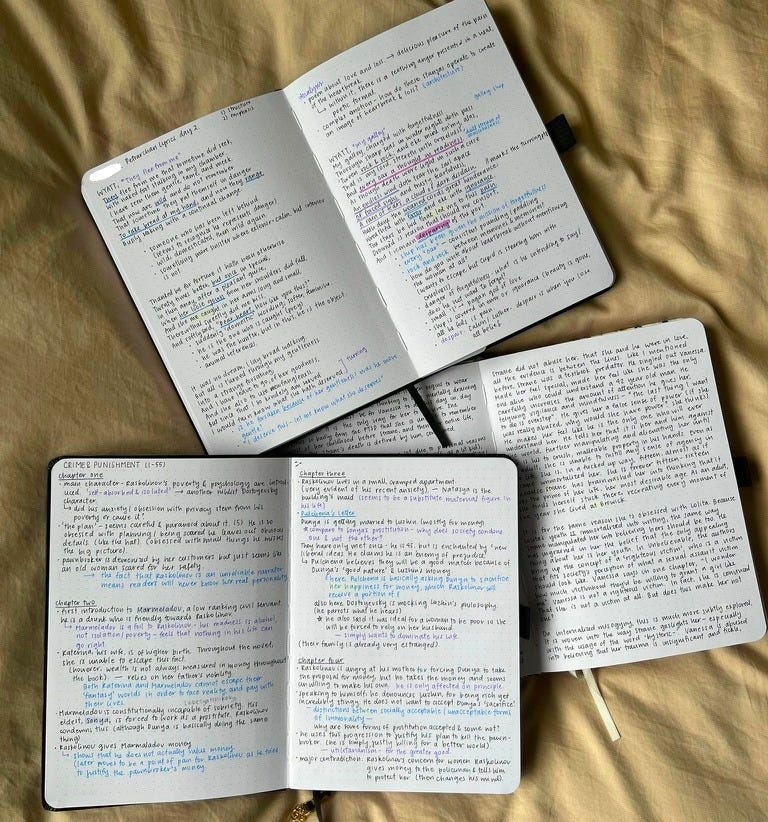annotating like a lit student
how to annotate, as a lit major who got an A in every single english literature class
If there is one thing that I love doing while reading a good book, it’s annotating.
I love annotating books I care about because doing so creates another dimension between the reader and the book. When you are reading, you are casually doing so and basically observing. But if you annotate, you are engaging with the text, opening up conversation, and reading between the lines. It allows for critical thinking and even acts an archive for all of your thoughts you can revisit.
I love that whatever I scribble, it feels like I’m rereading it with a past version of myself when I crack open the book again. For example, I have a copy of Anna Karenina that I’ve had since 2017. Since one of my focuses in college was Russian Literature, I ended up reading that book four times (with six editions on my shelf, because I’m terribly picky about translations and I couldn’t find one I liked). I love flipping through my original copy to see the annotations throughout the years overlay each other. I love comparing how 17 year old me perceived the book, compared to the last time I read it, when I was 21. My copy of Kira Kira has note scribbled in it from when I was 8. When I reread it before I went to college a decade later, I replied to my 8 year old self’s notes.

Annotations don’t always have to be serious and academic—they should truly just function as a means of communication between the reader and the book. They can also come in many forms, but this is just a very specific way to annotate for me. I know a lot of people scribble random thoughts and words in the corners of their books, or even doodle—which I really love seeing.
Unfortunately, I don’t really know how to annotate other way, than the Very Serious Literature Student way, albeit to a lesser serious degree (because nobody is really grading my reviews or essays anymore). So this is for any prospective literature students or anyone in general who wants to read more analytically!
things to do before you read
If I am reading a book for school, it is (arguably) not exactly going to be a fun and flirty time. When I was in school, my main goal for any book I read in classes was: knowing it inside out by the time I was assigned an essay / written piece on it. In order to do this, I tried to be somewhat informed before i even started reading.
This does not mean going on Sparknotes—oftentimes, I found that to actually be detrimental to my reading experience and ultimately my essay writing. Seeing other people’s opinions from the get go without giving the text breathing time in my brain, made me have a hard time formulating original ideas without thinking of the analyses I saw online. Here is what I do instead:
Step 1: Look up the synopsis. This should already give you a good idea of what to expect—what mood, what themes, what relationships are prevalent throughout the book.
Step 2 (optional): I never cared about spoilers for books i read for school. I would always try to find a brief summary of the book and write it out. This way, you can deepen your understanding of the book and what to expect. At this point, you should already have a list of themes and characters you want to look out for.
Step 3: Look up a brief biography of the author. Obviously, you'd have more information about the author it the book was published in 1910 versus 2010. But even with contemporary authors, there are most likely one or two interviews. Knowing even a little bit of the author's background and ideology or philosophy behind the book you are reading really helps.
i’ve started reading…now what?
Alright, you've opened the book and are now on page 20 ish. Now what?
I always had a mental checklist while reading the first 50 pages of a book.
What is the difficulty level of this book?
How many hours will it take me to finish?
What are the major prevalent themes?
Who are the major characters?
What do I want to be highlighting?
(I'll elaborate on the fifth point in further down the post).
If you are in school, you also want to figure out what themes you want to recognize and focus on. Good books are complex and multi-dimensional books with a plethora of themes and symbols. Your job is to pick out the major ones, but maybe even focus your attention on a niche theme you want to tackle in an essay (if your teacher/ professor gives you the liberty of choosing).
For example, when I read In Cold Blood, I decided to focus on how Capote portrayed the American Dream through both the victims and perpetrators. This required a much closer read for some parts, as the theme itself was woven through passages and not blatant or very apparent. Figuring this out early on will guide you as you read the book.
Even if you aren’t reading a book for a class, it’s always lovely to see how a theme progresses throughout the book. I know a lot of people focus on character and character development, but themes are as equally as important. How does an author develop and deepen the reader’s understanding of a certain topic? How does it manifest in different characters? How does it branch out?
As a chronic re-reader, I also love picking different themes and focusing my annotations on something different every time I read it. I did this with The Secret History, Middlemarch, and Conversations with Friends, to name a few.



